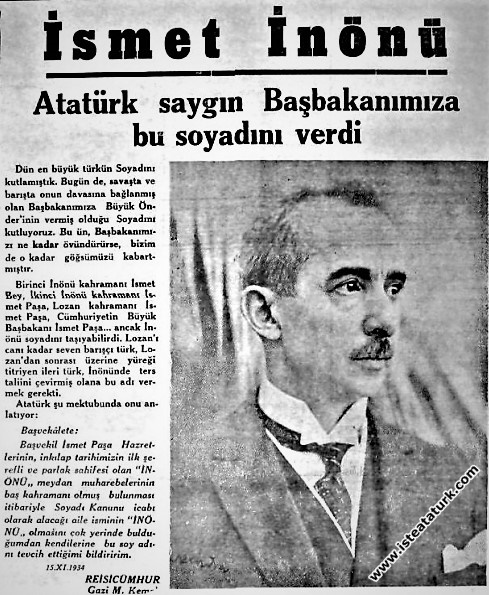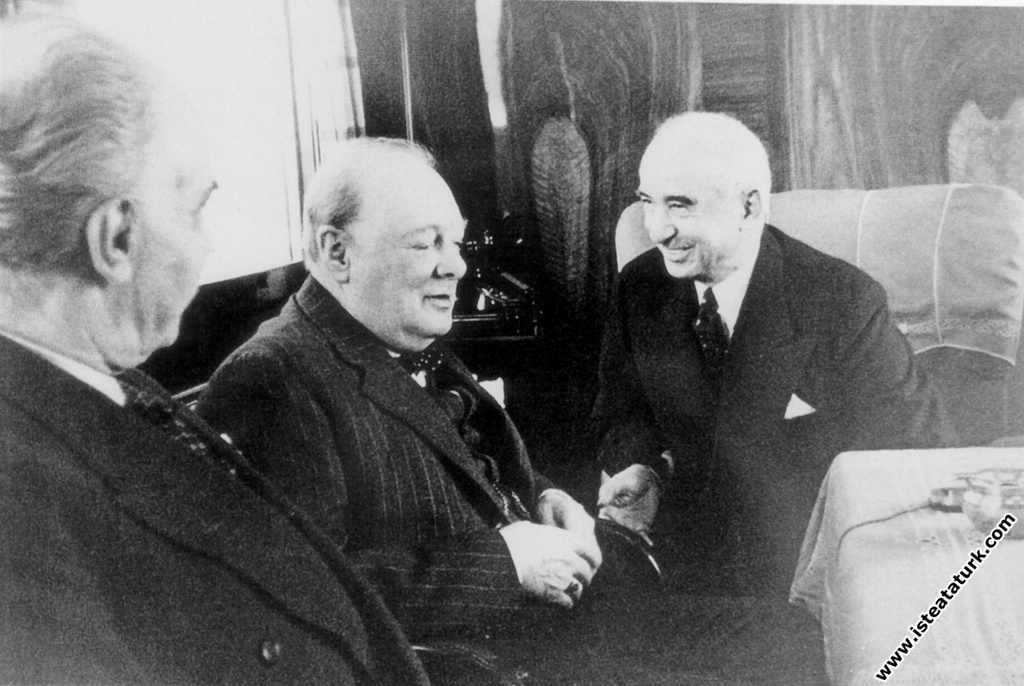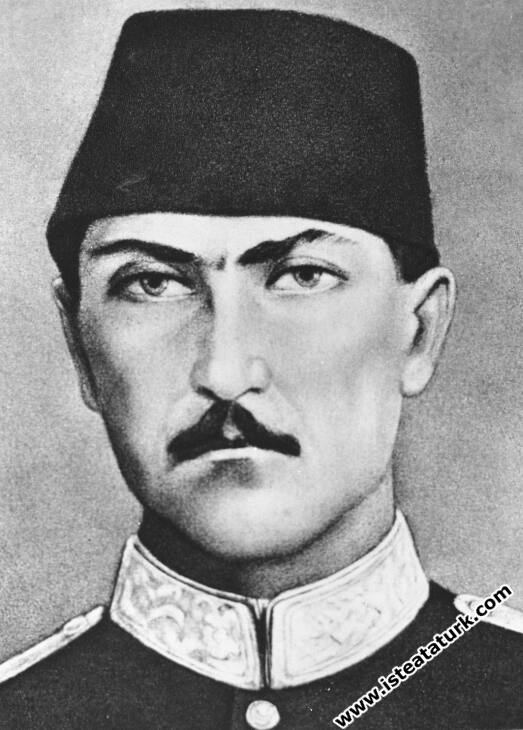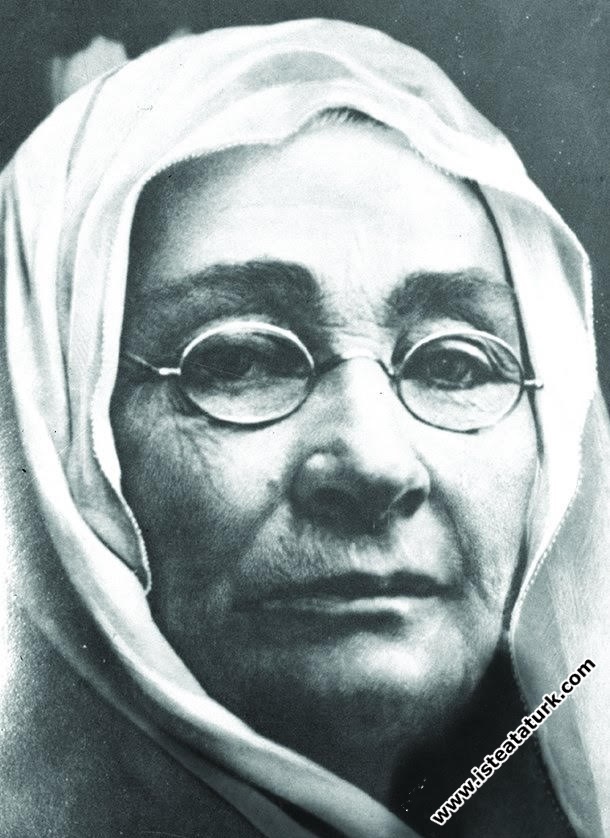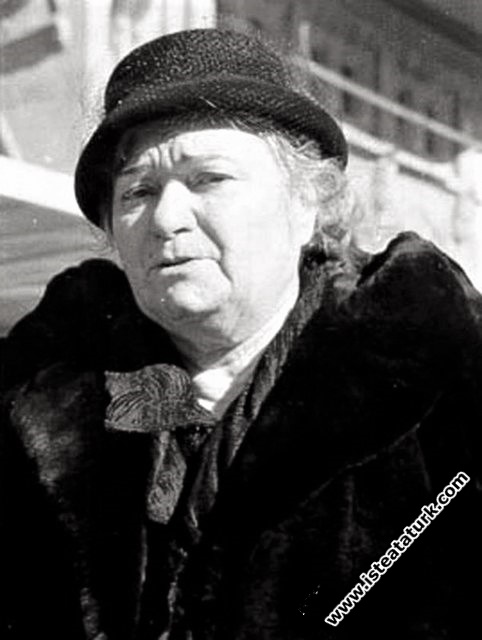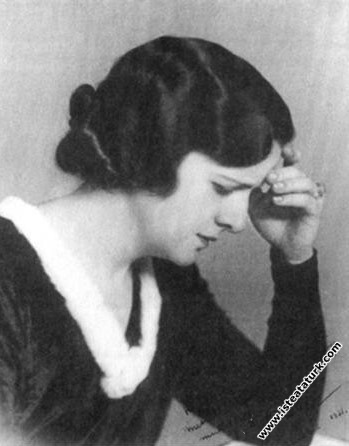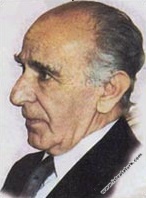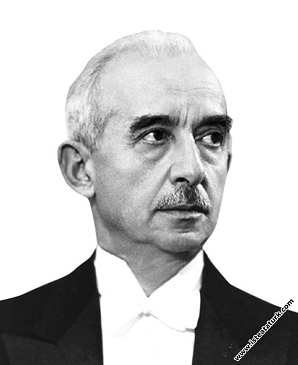
İsmet İnönü
Character Size
The Life of İsmet İnönü
İSMET İNÖNÜ
İsmet İnönü went down in history as a skilled soldier, a successful commander on the battlefields, and a great statesman.
He started his life as a soldier, took part in almost all wars in our recent history, and these duties trained him in military service and administration.
As an officer and commander, he served successfully in Yemen, the Balkan War, and the First World War, and received the best record that could be given to a corps commander from the 2nd Army Commander, Mustafa Kemal Pasha (Atatürk).
Mustafa Kemal Pasha, with his sense of close friendship and his realistic outlook towards the future, had already sensed in which duties and services Colonel İsmet Bey would be successful. During the life and death days of the National Struggle, he gave the greatest military duties and later the supreme state duties to İsmet Pasha.
Colonel İsmet Bey, who supported the Turkish Independence Struggle from Istanbul for a while, first came to Ankara on leave, then permanently, and participated in the preparations for the opening of the Grand National Assembly. He served in the Assembly as a Deputy of Edirne and in the government as the Chief of General Staff. As the Commander of the Front, he won the Battle of İnönü and was congratulated and appreciated by the President of the Grand National Assembly with an unforgettable message, which is a masterpiece in terms of military literature. Winning these battles proved how determined the Turkish nation was in defending its existence. He defeated the "unfortunate fortune of the nation" with these battles.
_%202%20(2).png) His active struggle and success against famous politicians in Lausanne made him even more glorified. From now on, the minister would carry heavy responsibilities as prime minister and president in the future.
His active struggle and success against famous politicians in Lausanne made him even more glorified. From now on, the minister would carry heavy responsibilities as prime minister and president in the future.
He was a statesman who did not attach importance to being praised or criticized in terms of his mental structure and temperament, and could spare the least time for self-defense. For this reason, he suffered many attacks, yet he made the least complaints. He was not the man who created problems, but the man who always solved the problems, and with this feature, he took his original place in Turkish history.
İsmet İnönü, who never surrendered unconditionally to any authority; He was a man of balance, confident in his own composure, his own values, and his calculus. He was not proud of his successes, nor was he intimidated by his defeats. For this reason, it was always at the forefront of Turkish history and diplomacy.
The period between 1938 and 1950 was when he was the loneliest. He assumed the responsibility of a state and a nation after Atatürk and where he left empty, and then managed to leave Turkey out of this war in a brutal and so terrible world war.
At the end of the Second World War, he encountered the demands of the Soviet Union targeting our lands and independence, but with his determined attitude, he ensured that these demands were withdrawn.
An important event and experience in İnönü's life is the separation from the one-party and authoritarian government system with his leadership and the transition to democracy. This event made him and his party lose power and burdened him with the responsibility of the opposition. The situation is not an easily digestible phenomenon for a person who has lived as a leader and chief, alone and indisputably in power by adorning his nearly twenty-five years with the crown of military victories, but İsmet Pasha managed to overcome this difficulty thanks to his patriotism, his unwavering belief in the era and democracy.
The views and practices of those who came to power at the end of the elections published on 14 May 1950 were different. A new understanding began to dominate in basic principles such as secularism and revolutionism and the reforms related to them. This situation led to discussions between the government and the opposition in the Parliament. Opposition leader İnönü did not join them. He only pointed out that these conflicts would endanger the future of the regime. As a matter of fact, when the attacks increased along with the concessions, the Armed Forces and the youth became restless. Events, arrests, party closures caused the army to seize the administration of the country on 27 May 1960.
İsmet İnönü predicted future events. In order to prevent these and to protect the democratic regime with legal powers, he accepted the Prime Ministry on 15 November 1961 and established the Coalition Government. The 12 February 1962, 21 May 1963 coup attempts and the military events that took place shortly after proved his foresight and that only Prime Minister İnönü could prevent these events.
There were also new developments in the outside world and foreign policy was gaining new dimensions. This time, the attacks of the Greek Cypriots on the Turks began. When these attacks turned into massacres, warning flights were made on 25 December 1963 and the Greeks were warned. The President of the United States of America, Johnson, thinking that he could prevent an intervention by declaring that we could not use the weapons received from the American aid in Cyprus, and following İnönü harshly, İnönü's response was “A new world will be established, Turkey will find its place there”.
This period of power did not last long, and he left his duty as the Prime Minister due to the influence of domestic and foreign political events. He also assumed leadership of the opposition.
Finally, developments in domestic politics in 1972 caused some disagreements within the party as well. As a result, on May 7, 1972, İsmet İnönü passed away from his party, which he founded and which he chaired for years, and on December 25, 1973, from us forever.
1. İsmet İnönü's Student Years and Military Life:
İsmet İnönü, whom we know as the famous commander of the Turkish War of Independence, the architect of the Treaty of Lausanne, the first prime minister and second president of our Republic, the founder and administrator of our democracy, was born in Izmir on September 24, 1884, during a depressed period in the country.
a. His successful student years coincided with the period of the most corrupt administration in the Ottoman Empire. The wars that followed each other, the internal uprisings, caused the economic and social situation to worsen day by day; Under the management of a weak and incompetent cadre, the nation has faced great difficulties in a system that has become inoperable.
b. İsmet İnönü graduated from the Mühendislikhane-i Berrî-i Hümâyun (Artillery School), which he entered on February 14, 1901, as an artillery lieutenant and with the first rank on September 1, 1903; Lieutenant İsmet, who was transferred to the staff class due to his success, was awarded the Gold Education Medal by graduating first in the Military Academy. He was given the command of the 2nd Army in Edirne with the rank of staff captain on September 26, 1906, and attracted the attention of his commanders with the lectures he gave in the artillery regiment, where he did his continental internship as the battery commander, and in the division to which this regiment was affiliated, with the exercises he prepared and directed. İsmet Bey, who became a kolağası (Senior Captain) in 1908, worked at the 2nd Cavalry Division Headquarters of the "Operation Army", which suppressed the 31 March Incident on 13 April 1909. During his brief tenure there, he advocated keeping the military out of politics. İsmet Bey attracted the attention of the Chief of General Staff of the time, Ahmet İzzet Pasha, with his intelligence and knowledge, during the great maneuver in Rumelia. When Pasha was assigned to suppress the 1910 Yemeni Uprising, he took İsmet Bey to his headquarters. Due to his successful services here, he was awarded the Fourth Rank Medjidi Order and one year of seniority. Promoted to the rank of major on April 26, 1912, İsmet Bey became the Chief of Staff of the Yemen Crew Forces.
In 1913, he was appointed to the 2nd Balkan War General Headquarters, then he was given the command of the right flank in Çatalca. It was a very critical period. Bulgarians had taken Edirne. There were differences of opinion and strife in the army. Enver Bey and his friends wanted a general offensive, and those at the head of the army saw this as impossible.
When the war between the Serbs, Bulgarians and Greeks started, Edirne was taken back and the Balkan War ended. He was assigned to the General Headquarters in the First World War and completed the mobilization preparations by working day and night. Then he was assigned to the 1st Army Headquarters commanded by Liman Von Sanders Pasha. The Deputy Commander-in-Chief Enver Pasha and the 1st Army Commander trusted this young staff very much and gave him the most important duties. Meanwhile, he became a lieutenant colonel on November 29, 1914, with two years of seniority from the Balkan War. With three years of seniority from the First World War, he was promoted to the rank of colonel on 14 December 1915 and was appointed as the Chief of Staff of the 2nd Army in Çanakkale. After the 2nd Army went to the Eastern Front, Colonel İsmet Bey was the first to welcome the 16th Corps Commander of this army, Mustafa Kemal Pasha, in Diyarbakır. When Mustafa Kemal Pasha became the Deputy Commander of the 2nd Army on 25 November 1916, he offered Colonel İsmet Bey to be appointed to the 4th Corps Command, and this proposal was realized on 12 January 1917. The period when İsmet Pasha commanded the strategic units began with the 4th Corps Command. When Colonel İsmet Bey was appointed to the 20th Corps Command on May 1, 1917, these two friends, who had a close fate and cooperation in the battlefield and joined hands for the defense of the homeland, separated for a temporary period.
Colonel İsmet Bey, who joined the corps on the Arabian front, was appointed to the 3rd Corps Command on 20 June 1917, shortly after. After Mustafa Kemal Pasha was appointed to the 7th Army Command on July 5, 1917, these two friends met in the same organization on the Syria-Palestine front and worked together until October 11, 1917. On this date, Mustafa Kemal Pasha, who could not agree with the Commander of the Army Group Falkenhein, resigned and left. On August 7, 1917, they met again with Mustafa Kemal Pasha, who was appointed to the 7th Army Command for the 2nd time, during the most critical period of the operation, and they saved their units from destruction by implementing the timely withdrawal decision of Mustafa Kemal Pasha with the least casualties.
İsmet Bey was ill; He first went to Aleppo for treatment and from there to Istanbul, and on October 24, 1918 he was appointed to the Undersecretariat of the Ministry of War.
Due to his successful work in the First World War, he was given four years of expeditionary seniority and was awarded with eleven medals and medals.
During his stay in Istanbul, he met with Mustafa Kemal Pasha first in his house in Şişli and participated in the design of the War of Independence. After Mustafa Kemal Pasha went to Anatolia, they were in constant contact with him. He invited him to Ankara on 8 January 1920. They talked for a long time there and made plans. On February 3, upon the invitation of the Minister of War, Fevzi (Çakmak) Pasha, he returned to Istanbul.
After the British occupation of Istanbul, the closure of the Parliament, the deputies and some generals and officers were arrested and sent to Malta, he left Istanbul on March 19, 1920, dressed as a private, and returned to Ankara on April 9, 1920, after a very troublesome journey. He came and participated in the preparations for the opening of the Turkish Grand National Assembly. Meanwhile, the Greeks had started to attack on all fronts in Western Anatolia. Colonel İsmet Bey became the Deputy of Edirne on April 23, 1920, and the Chief of the General Staff on May 3, 1920. On November 10, 1920, he was appointed as the Commander of the Northern Section of the Western Front, with the authority of the Army Commander, without prejudice to his duty as the Chief of the General Staff. On May 4, 1921, he became the Commander of the Western Front.
_%203.png) Ethem Bey, who was at the head of the strongest of the national forces in İnönü, did not want to be under the command of the regular army and meanwhile İsmet Bey, and as it is known, he withdrew in the face of the forces directed against him and joined the Greeks with his brothers. Taking advantage of the fact that some of the troops on the Western Front were directed against the rebel Ethem, the Greeks attacked the İnönü position on January 6, 1921 and started the First İnönü Battle. The First Battle of İnönü resulted in success thanks to the measures taken by the Front Commander. Upon this success, Colonel İsmet was promoted to General by the Grand National Assembly on March 1, 1921.
Ethem Bey, who was at the head of the strongest of the national forces in İnönü, did not want to be under the command of the regular army and meanwhile İsmet Bey, and as it is known, he withdrew in the face of the forces directed against him and joined the Greeks with his brothers. Taking advantage of the fact that some of the troops on the Western Front were directed against the rebel Ethem, the Greeks attacked the İnönü position on January 6, 1921 and started the First İnönü Battle. The First Battle of İnönü resulted in success thanks to the measures taken by the Front Commander. Upon this success, Colonel İsmet was promoted to General by the Grand National Assembly on March 1, 1921.
The Greeks, who wanted to take the pain of this defeat, gathered their forces and started an attack on the whole front on March 23, 1921. The weight center of the attacks was again directed towards the İnönü positions. But this time they were defeated and pushed back. Ismet Pasha, in the telegram he sent from Metristepe to Ankara on April 1, 1921, said in summary: "The enemy has left the battlefield filled with thousands of dead to our victorious arms."
Mustafa Kemal Pasha was responding to this telegram from Ankara with a unique congratulatory message, "Sjz, you defeated not only the enemy there, but also the unfortunate luck of the Turkish nation".
With the victories of İnönü, he increased the prestige of the National Government at home and abroad, and the self-confidence of the army.
The Greeks attacked the western front troops on the Kütahya-Eskişehir general line on July 10, 1921, with the large forces they could gather in order to encircle and destroy the majority of the Turkish army from the south. İsmet Pasha did not crush his forces against the Greek army of Asia Minor. In accordance with the instructions of Mustafa Kemal Pasha, who had come to the front at that time, he gathered his troops in the north and south of Eskişehir and managed to withdraw to the east of the Sakarya River.
In the Sakarya Pitched Battle; The aim of the strategy implemented by the Turkish Armed Forces was to gradually paralyze the fighting power and determination of the Greeks through strategic defense, and to start the preparations for the attack to be undertaken in order to get a final result on the Greek Armed Forces after this was achieved. Tactically, the Sakarya Pitched Battle is a surface battle fought at a depth of 25 kilometers.
When the enemy failed to besiege, he tried to break through and captured Çaldağı with the forces he gathered. Front Commander İsmet Pasha stopped the Greek attacks by taking the necessary precautions with the directives of the commander-in-chief and ensured the integrity of the front with the reserve units he gathered.
In the face of the Turkish resistance, the Greek Army was defeated in the Battle of Sakarya, which lasted for 22 days and 22 nights, and withdrew to the Eskişehir-Afyon positions. Unfortunately, the Greek withdrawal was not defeated due to the lack of strong agile units at the disposal of the Front Command. The Sakarya Victory increased the prestige of the Grand National Assembly Government at home and abroad; He ensured the conclusion of the Kars Treaty and the Ankara Agreement. İsmet Pasha was given a commendation and the Golden Battle Concession Medal by the Grand National Assembly for his success in the Sakarya Pitched Battle.
The Great Offensive began with an operation on the southern front of Afyonkarahisar, crushing some fortified positions of the enemy.
The Turkish army dismantled the Greek army, which was settled, organized and fortified on a dominant land under normal conditions, with a full raid attack, dispersed and defeated it without giving them the opportunity to use their reserves. In the meantime, the enemy was not allowed to resist by holding on to the positions further back by being followed quickly.
The Great Offensive is the focal point of the Turkish War of Independence and a great military victory in which the enemy was destroyed in the sacred hearth of the Turkish homeland.
Atatürk said, “I feel completely comfortable in the face of the nation, the army and history, as the presence and outstanding effort of İsmet Pasha, both in the Chief of General Staff and in the later command of the front, has effectively demonstrated my infallibility in assigning him a task.” .
İsmet Pasha, not only with the Front Command of this operation, but also as the Head of the Turkish Delegation at the Mudanya Conference and as the Turkish Chief Delegate at the Lausanne Conference, also provided the political assurance of the Turkish Struggle for Independence.
İsmet Pasha became a Lieutenant General on August 31, 1922, and a General on August 30, 1926, and retired from military service on June 30, 1927.
İsmet Pasha achieved all ranks in blood and fire against the enemy armies. The meaning it gives to heroism is much broader than the heroism shown in war. Being able to think freely, telling the truth without deviating from devious ways and without contempt for lies are also included in this concept. On November 21, 1923, the Grand National Assembly awarded İsmet Pasha with the Medal of Independence.
2. İsmet İnönü's Government Membership and Prime Ministry Period
Mustafa Kemal Pasha brought İsmet Pasha to the Ministry of Foreign Affairs before sending him to the peace talks to begin in Lausanne, and İsmet Pasha attended the Lausanne Conference as a minister.
İsmet Pasha passed much bigger tests on the battlefields in Lausanne. A 500-year-old Empire was being liquidated. There were capitulations, there were debts, there were war reparations, the redrawing of borders, the establishment of an independent Turkey. All these difficult cases were resolved one by one with the patience of İsmet Pasha and the support of Mustafa Kemal Pasha and peace was signed.
The work of the 2nd term of the National Assembly started on 11 August 1923. A new cabinet was formed on 14 August. Former Prime Minister Rauf Bey (Orbay) resigned because he could not come to an agreement with İsmet Pasha during the Lausanne Conference. Fethi (Okyar) Bey established the new cabinet. İsmet Pasha kept the Ministry of Foreign Affairs in this cabinet. Parliament approved the Lausanne Peace Treaty on 23 August 1923.
İsmet Pasha during the Lausanne Conference.
On the night of October 28, Mustafa Kemal Pasha, after having a dinner conversation with some of his friends in Çankaya, detained İsmet Pasha and made İsmet Pasha note the necessary amendment for the first constitution of the Republic of Turkey to be established. The next day, the Assembly passed this bill.
Thus, the Republic of Turkey was established. Mustafa Kemal Pasha was elected as the first Presidency of the new state on 29 October 1923 at 20:44, and he gave the task of forming the first cabinet to Malatya Deputy İsmet Pasha. İsmet Pasha served as Atatürk's prime minister for 12 years, after a short break. This period is the period when revolutions were made one after another, the foundations of the Turkish economy were laid, the Republic was settled, and a wide relationship was entered into with the world states.
On March 3, 1925, Fethi Bey's government had fallen and İsmet Pasha formed his second government. The Sheikh Said Rebellion, which started during the reign of Fethi Bey, spread to 14 provinces in the East and Southeast. The first job of the İnönü Government was to suppress the rebellion. The Independence Court, operating in Diyarbakır and Elazığ, sentenced 29 people to death on 27 June 1925. The rebellion was suppressed though. In fact, large areas such as Dersim and Ağrı were completely evacuated and turned into forbidden zones. But the land saving and its protective institution, the sheikh and discipleship, could not be liquidated. The abolition of the tithe gave some relief to the villagers. The cruelty of the contractors, who collected this tax on behalf of the government, overwhelmed the villagers and became the nurturing power of the notables. It was a daring decision to deprive the Ismet Pasha Government of its over-budget income, which would soon implement a major railway policy.
The great depression that broke out in America on October 29, 1929 and swept the whole world in 1930 did not shake the Turkish economy to the extent that it affected any Western country, but Turkey, which had established most of its political and economic relations with the countries directly affected by the crisis, indirectly faced certain bottlenecks. had faced.
On November 24, 1934, the National Assembly gave Gazi Mustafa Kemal the surname Atatürk with a special law. Two days later (November 26, 1934), Atatürk honored İsmet Pasha with the surname (İnönü) for his usefulness in the Battle of İnönü.
Hakimiyet-i-Milliye Newspaper. (26 November 1934)
As it is known, Atatürk mostly dealt with the general policies and issues to be followed by the state and cultural affairs such as language and history. Falih Rıfkı Atay said, “Atatürk is a man of great movements. He did not like to argue with details. A new state was being established. A competent helper was needed to deal with a thousand and one issues of this. İnönü was a major factor in the establishment of the new state and the conduct of government affairs. He added that Atatürk said at every opportunity, “If I am comfortable in Çankaya, it is thanks to İsmet”. Throughout his life, İsmet Pasha always praised his invaluable comrade in arms and the President, never strayed from his path, and never compromised on his principles.
İsmet İnönü's resignation from the Prime Ministry was caused by Atatürk's stance as an intervention in the government.
After İnönü left the Prime Ministry, his friendships with Atatürk continued, and when İnönü was told about the extraordinary performances at the stadium, “Well they did, what can be natural to applaud a man who has been the Prime Minister for so many years? It means that this nation knows how to respect their big assumptions.”
Celal Bayar, who took his place, always kept a gentle distance in favor of İsmet İnönü.
Atatürk and İnönü not only cooperated but also cooperated in the abolition of the sultanate and the caliphate, that is, we cannot evaluate the role of İsmet Pasha in the developments up to this point and in the events that follow, within the specific and limited duties of a prime minister.
3. The Presidency of İsmet İnönü
When the Turkish nation lost Atatürk on November 10, 1938, the Turkish Grand National Assembly convened on November 11 and elected İnönü as the 2nd Presidency of the Turkish State. It was the eve of the Second World War. As the President and Chairman of the People's Party, İnönü was planning to return to the multi-party parliamentary system. As a matter of fact, he explained this thought in a speech he gave at Istanbul University. But since the Second World War began, he left his designs in place.
During the war that lasted for six years, İsmet İnönü proved that he was also very successful in foreign policy, and focused all his attention on not putting Turkey in the fire.
İnönü evaluates the current conditions very well and knows the war very well. For this reason, his logic has saved both himself and those around him from blindfolded adventures. composure and logic; Feeling and excitement always prevailed in İnönü.
On September 1, 1939, the war started as the German-Polish War and developed as the European War in 1940 and became the World War in 1941. In this war, Turkey had no case to settle. He was considering the continuation of his existence and was taking the necessary measures to protect his integrity.
But Turkey's political situation included it, both as a Mediterranean and a Balkan State, in the conflicted areas of the world and the issues of these areas.
There were also the commitments made by Turkey, which seriously contradicted its efforts and necessity to stay out of the conflicts in this war, and for this reason, the issues were getting more and more bifurcated for Turkey.
As we entered 1940, the German-Soviet Union were still allies. In March 1940, Moltof was giving speeches praising German friendship, and Hitler was philosophizing this friendship in his own way. According to Hitler, this pact, which would ensure eternal peace between Germany and Russia, was made, but its life could only last until June 22, 1941, and on this date, the bloodiest showdown between the Germans and the Soviet Union began.
The Second World War, which started with Germany's attack on Poland on September 1, 1939, was developing so quickly that it could hardly be traced even on the map. Nobody expected that France would collapse so quickly. He says that if Hitler's success is delayed in order to take us on their side, as the Germans did in the First World War, the reason is İnönü. They said we would.
The Italians, who were allies of Germany, also continued their invading attitude.
On October 28, 1940, the Italians attacked Greece. This situation could compel us to enter the war. Because, in accordance with the 3rd article of the triple alliance, if England and France helped Greece, Turkey would also join the war. These states gave guarantees to Greece and Romania on 13 April 1939. As a matter of fact, they wanted us to join the war as soon as possible.
Turkey was a member of the Balkan Pact. Because of this pact, they had commitments to Greece. This required us to join the war.
Although İnönü was not neutral, he signed a non-aggression pact with the Germans on 18 June 1941 to protect the Turkish independence provided by Atatürk and achieved at the cost of much blood, by staying out of the general war. This pact took the British by surprise. But it made America very angry. They stopped helping.
The Germans attacked the Soviet Union on June 22, 1941.
By 1942 the Axis front had reached its widest limits in the world, but the first major enemy to defeat German power on the Russian plains was the winter of 1942 in Russia. A constant cold that went down to -40 degrees, endless blizzards that the Germans were not accustomed to caused the German army many casualties and caused them to be defeated.
Churchill (Vinston S. Çürçhil) said to İnönü in Adana that the Germans would be defeated by the war's transition to the Balkans, and he wanted our help for both land and air operations, that is, to join the war before the end of 1943.
İnönü reported that Turkey was unsure of Soviet Russia and requested extensive arms and equipment for the army.
At the meeting of the Tehran Conference on November 28, 1943, Turkey's situation was discussed and İnönü was invited to Cairo.
İnönü attended the Cairo Conference, which took place on 1-6 December 1943, on the condition of negotiating the issues through free discussion between equal parties. Many things had been settled in Cairo, but one issue remained. That was Turkey's entry into the war. This is how it was resolved. Raw materials and materials will be taken from Turkey as much as necessary, but if Turkey is attacked, it will enter the war.
On June 6, 1944, the Allies landed on the Normandy beaches of western France, opening the second front.
The Germans activated their secret weapons. V.1 and later V.2 pilotless planes began incursions into England. But it's too late now.
On January 13, 1945, Turkey decided to open the Straits to allied ships. On January 23, 1945, he declared war on Germany and Japan.
On April 28, 1945, Mussolini was shot by his own citizens in Italy. On April 30, 1945, Hitler committed suicide.
On May 2, Berlin fell. Germany surrendered unconditionally.
On August 6, 1945, the first atomic bomb was dropped on the city of Hiroshima in Japan. It was followed by the bombing of Nakazaki, which surrendered in Japan on August 14, 1945.
There were such moments in this war that not only Turkey's future, but also its entire destiny, depended on İnönü's attitude and the decisions he would make.
For example, Turkey's entry into the war on the side of Germany could quickly land the Germans in Suez and the Persian Gulf and provide German-Japanese unification, as well as taking action over the Caucasus, attracting important Russian troops and shifting the troops in the Far East to the German front. could have prevented.
During the Second World War, no head of state was faced with crises that are as full of problems and sometimes seem insurmountable as İnönü's. Those who remained lost the fate of themselves and their country to uncertain currents.
World War II was over. But this time we were faced with a very serious foreign policy issue that threatened the territorial integrity of the country and the independence of the nation. İsmet İnönü was going through very difficult days. We can summarize the issue as follows:
The Soviet Union was claiming that Kars and Ardahan should be left to Russia and a base in the straits should be given in order to renew the Treaty of Friendship signed with Turkey on 17 December 1925. This request was also among the subjects of the Potsdam Conference, which started on 17 July 1945. The conference decided to notify Turkey of these requests. İsmet İnönü declared that “Turkey will not give up even an inch of land, if necessary, we will die with honor”.
The fact that Truman, who was the US President at the time, appropriately insisted that Turkey was an ally of the United States, and İnönü's determined stance enabled the Soviets to give up on these requests.
Turkey ensured its security by taking its place in the "North Atlantic Treaty Organization" (NATO), the world's largest collective security system, on October 17, 1951.
Meeting of Turkish President İsmet İnönü and British Prime Minister Winston Churchill in Adana 30 January - 1 February 1943
İnönü, in his speech on May 19, 1945: “As the assets of wartimes, which need prudent measures, disappear, the principles of democracy will prevail in the political and intellectual life of the country to a greater extent.” said. This promise led to the establishment of a multi-party parliamentary system and a democratic structure in Turkey.
At the beginning of 1946, the Democrat Party, headed by Celal Bayar, was founded. In the same year, the People's Party won the majority in the municipal and parliamentary elections, but there was a gap between the administration and the opposition in these elections. İnönü anesthetized the government and the opposition by issuing a circular known as the 12 July Declaration. Some laws were changed, a new election law was enacted. The Democratic Party won the 1950 parliamentary elections.
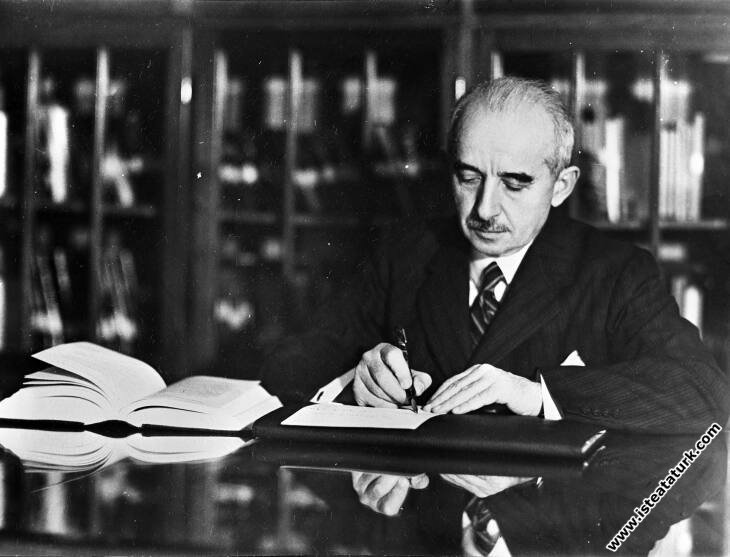
İsmet Pasha is at work.
İsmet İnönü worked as an opposition leader until 1960. On May 27, 1960, the army seized power. The Democratic Party government was put on trial. The Constituent Assembly was elected and the new constitution was made. New elections were held on October 27, 1961, and although the People's Party had the most deputies in these elections, it could not come into power alone. President-elect Cemal Gürsel gave the task of forming the cabinet to İnönü. İnönü formed three coalition cabinets in succession. When his last cabinet was overthrown in the Parliament, he returned to the leadership of the opposition. However, it was an important service that he bravely suppressed the February 22 and May 21 uprisings during his prime ministry. The initiation of the planned economy coincides with his prime ministership.
Upon his disagreement with the Secretary General, he resigned from the presidency in the extraordinary congress. Later, he entered the senate by using the senatorial right granted to the former presidents and continued his parliamentary work like a simple parliamentarian. His death on December 25, 1973 had repercussions all over the country and the world.
Conclusion:
İsmet İnönü's life covers the conditions and events of a period. It is the flow of an era. He is involved in the wars, revolutions, reckonings with foreign countries, various reform and reform movements, the transition from the one-party regime to a new order and all the shocks of this transition, all the problems of these events in our recent history.
İsmet İnönü is a soldier in the first part of his life, later both a soldier and a diplomat, and a statesman in the second part of his life; either as the government or as the head of state, it is the person or one of these people who determines the destiny of the country.
.jpg)
Ismet Pasha with his family.
His principle as a soldier, as a leader is this: “Wars and struggles must not be lost in the minds of the commander, the leader first. Otherwise, everything can be lost on the battlefields, on the battlefields. But if the commander or leader has not lost the fight in his own mind, the battle is not lost.”
İsmet İnönü applied this principle throughout his life and generally won the victory.
As a soldier, just as he won the battles in the most unfavorable conditions, as the President, he endured the contradictory demands and pressures of the most powerful states, managed to keep his country out of the Second World War, which cost the lives of 30 million people, and, as a surprise, at the end of the war, we lost our territorial integrity to the Soviet Union. has categorically rejected his demands that threaten our independence.
He suppressed two revolution attempts in a short time with his determined stance stating that he would never allow a closed system that gave up democracy.
The glorious life of İsmet İnönü ended on December 25, 1973, and he took his place in the Anıtkabir of his close friend and President Atatürk. Bless their souls.
Note: Author's Gnkur. From his work titled “Ismet İnönü” from the Turkish Soldiers and Victories series published by the ATASE Presidency (Ankara, Gnkur. Basımevi, 1987)
Retired Staff Colonel Nusret Baycan
Source: ATATÜRK ARAŞTIRMA MERKEZİ DERGİSİ, Sayı 15, Cilt V, Temmuz 1989
İNÖNÜ HOUSE MUSEUM
İsmet İnönü's father, a lawyer, Reşit Bey's first place of duty is Çatalca. Reşit Bey, who married Cevriye Hanım in Istanbul, is appointed to the Izmir Courthouse as the Assistant Coroner. İsmet Bey was born in 1884 in his uncle's house, which is now the İnönü House Museum.
İsmet İnönü describes his memories of İzmir in his book “Memories” as follows:
“I spent the year-end holidays of my military education in Izmir for six years. Going abroad to Izmir with my uncle has been a blessing and an opportunity for me to open up and flourish. The modest little house on the Değirmen mountain, facing the sea, still seems to me the most beautiful mansion in the world. I would rest, I would travel. I would read French newspapers, and if there was an extraordinary event in the four corners of my country, I would learn and follow it. Finally, I would get some preparation for next year's classes, and sometimes I would also take language lessons. My little uncle was a doctor, a literature lover. It was my pleasure to be with him. Our generation was fond of literary works and movements, both open and closed, she. We used to buy all the literary works that were forbidden in Istanbul and Izmir as lithographs from the corner. We used to find what we wanted among the old books sold at the beginning of the Tunnel in Istanbul. Izmir, therefore he became my main lover when I was thirteen to twenty-two years old. When I entered İzmir sixteen years later under completely different conditions, among my various feelings, the excitement of meeting a lover was also included.
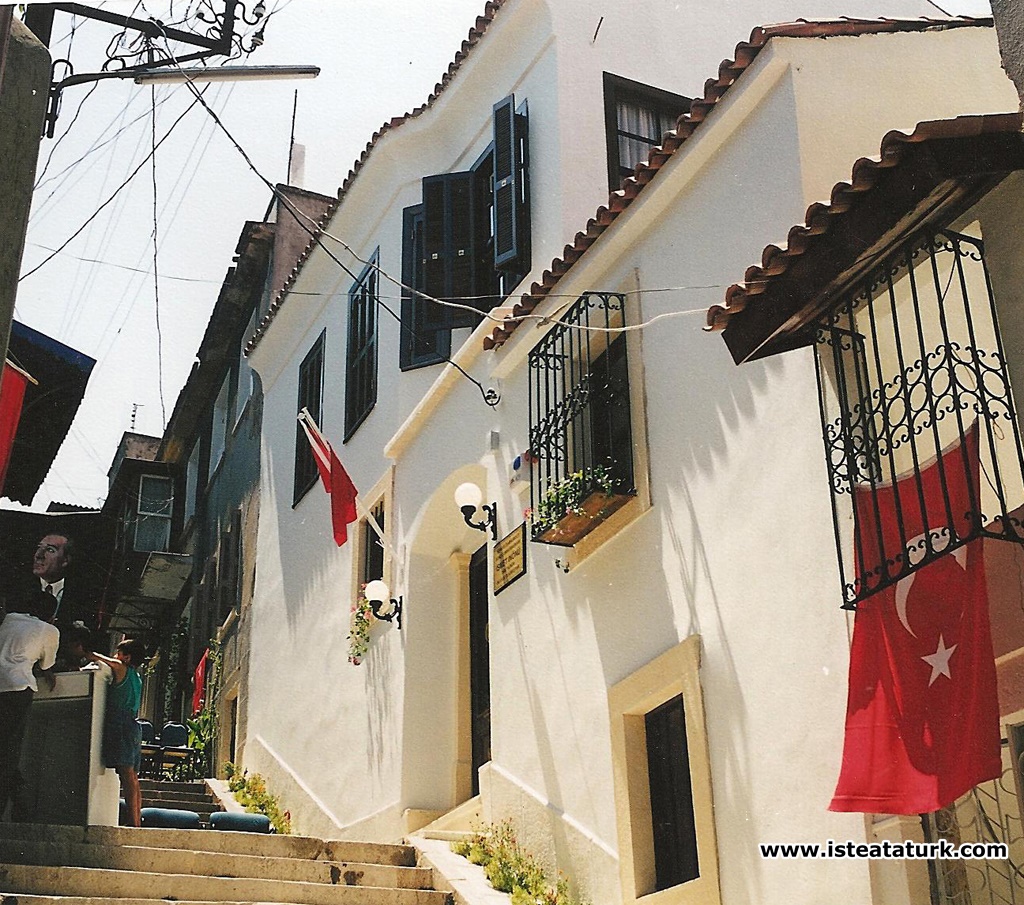 During the presidency of İsmet İnönü, the house was built by İzmir Mayor Dr. It was purchased by Behçet Uz on behalf of the municipality from two sisters living in the house.
During the presidency of İsmet İnönü, the house was built by İzmir Mayor Dr. It was purchased by Behçet Uz on behalf of the municipality from two sisters living in the house.
After 1950, this house was bought by Şerif Remzi Reyent, one of the businessmen from İzmir, who is close to İnönü, when İzmir Municipality wanted to sell it. Şerif Remzi Reyent gifted the house to his niece Ayla Ökmen and she donated the house to the “İnönü Foundation”. With the help of the Mayor of the period, Yüksel Çakmur, the house was repaired and its interior was arranged.
However, after this first repair, a radical restoration was needed in the house. In 1998, the “İnönü House Museum” was designed by the History Foundation and the Izmir Directorate of Surveying and Monuments. The house was restored with the great effort of Izmir Governor Kemal Nehrozoğlu and with the financial support of the Special Provincial Administration. Sculptor Cahit Koççoban, Director of İzmir Painting and Sculpture Museum, has completed interior works with great devotion.
İnönü House Museum was opened to visitors on 24 July 1999. The street, which also carried out environmental renovation, was named “İnönü Street” by the Izmir Metropolitan Municipality on September 9, 2000.
In the house, İsmet İnönü's official and family photographs, in his military clothes, are exhibited. Konak Municipality is still taking care of the maintenance and repair of the İnönü House Museum.
İzmir İnönü House Museum:
Open days: Tuesday, Thursday, Saturday from 10:00 to 17:30 and on public holidays.
Address: Türkyılmaz Mahallesi 842. Sok. (Inonu Street), No: 20 Mansion - IZMIR
Tel: 0 232 445 55 99
Source: Ahmet Gürel, İTK Uşakizade Köşkü Md.
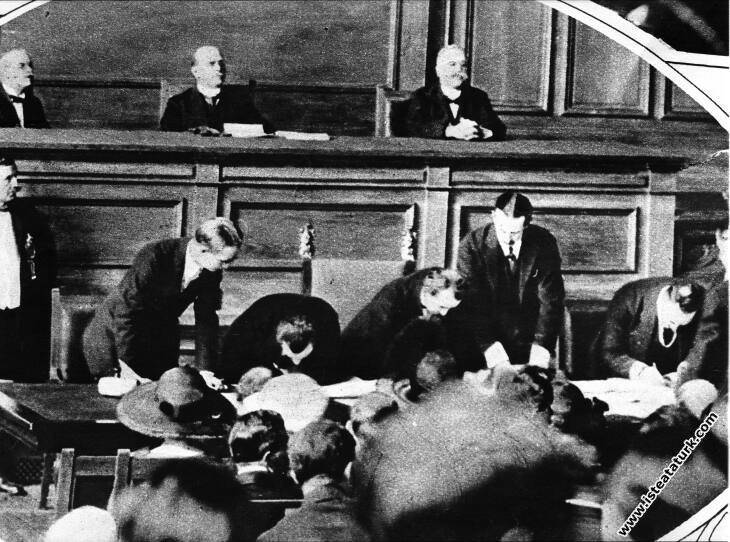
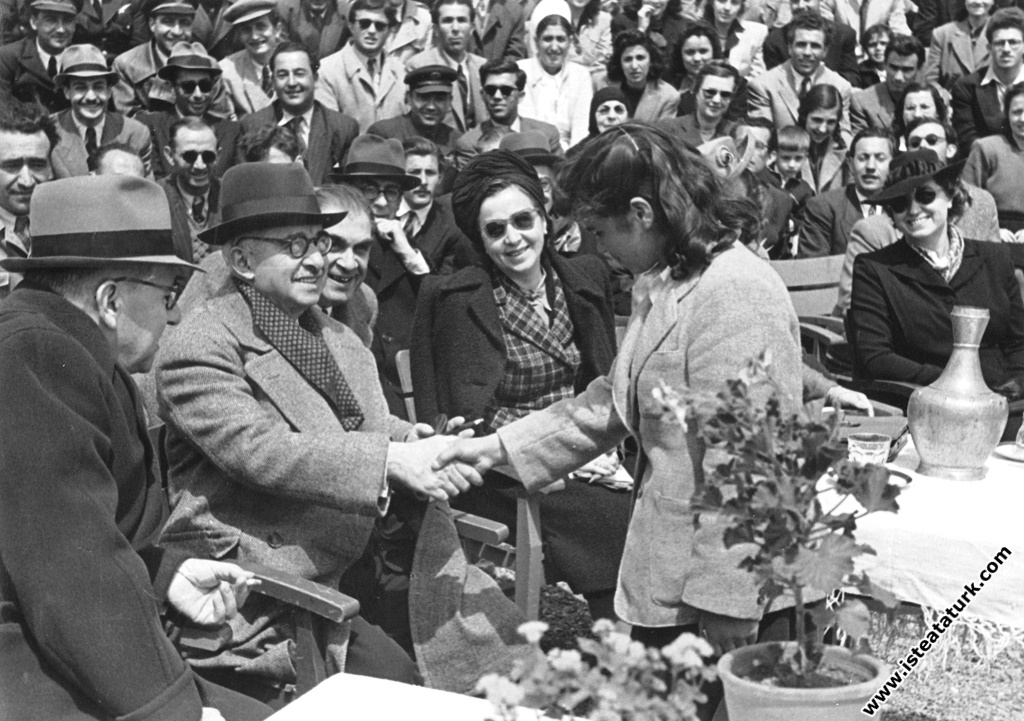
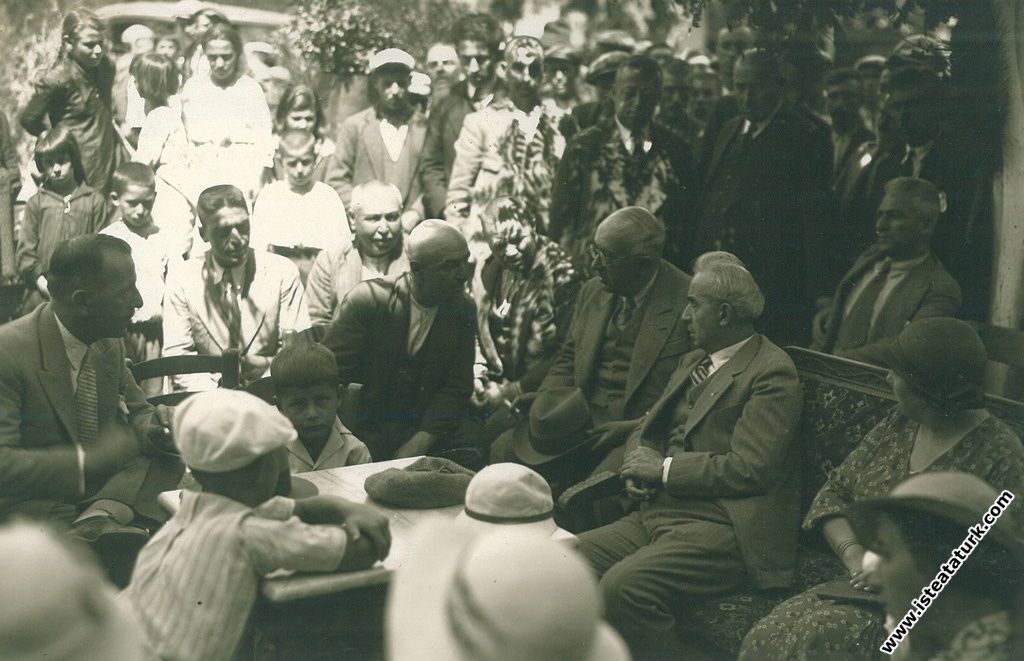
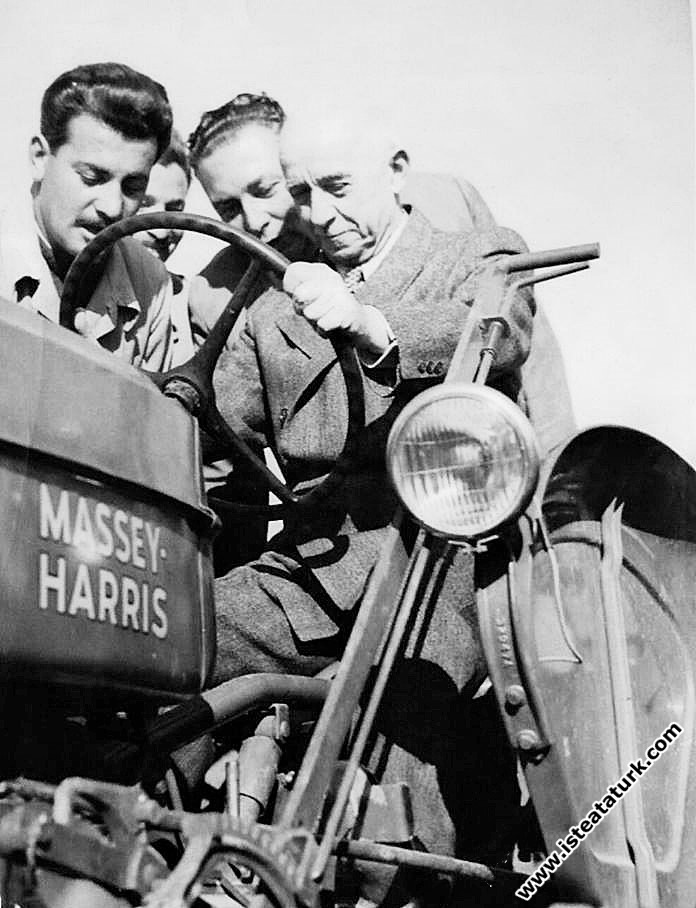
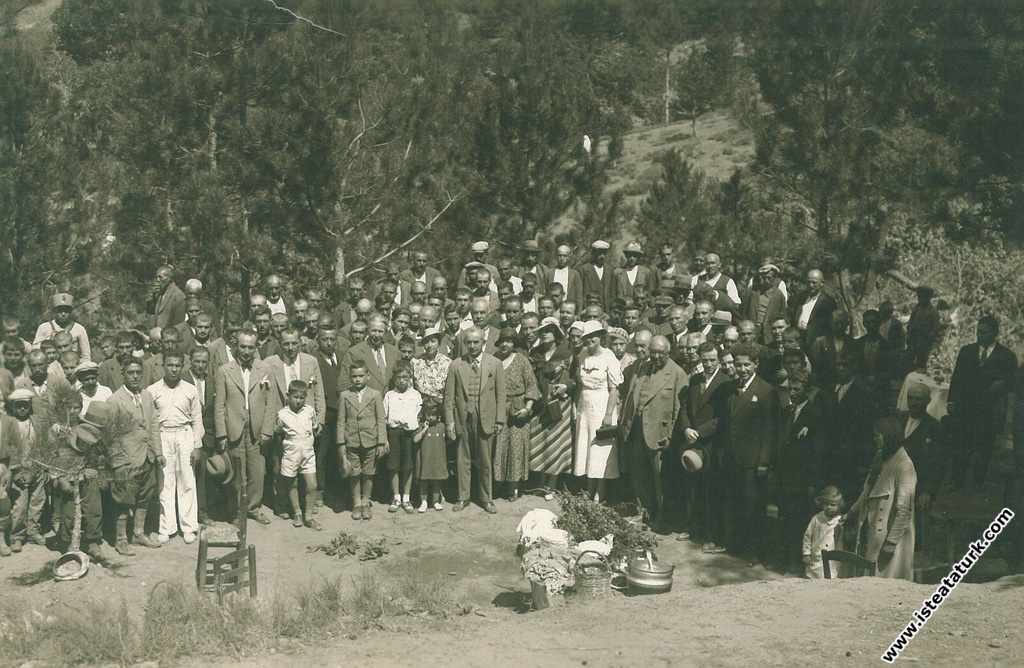
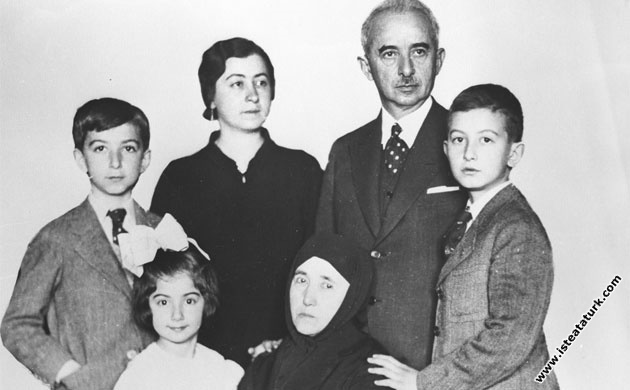
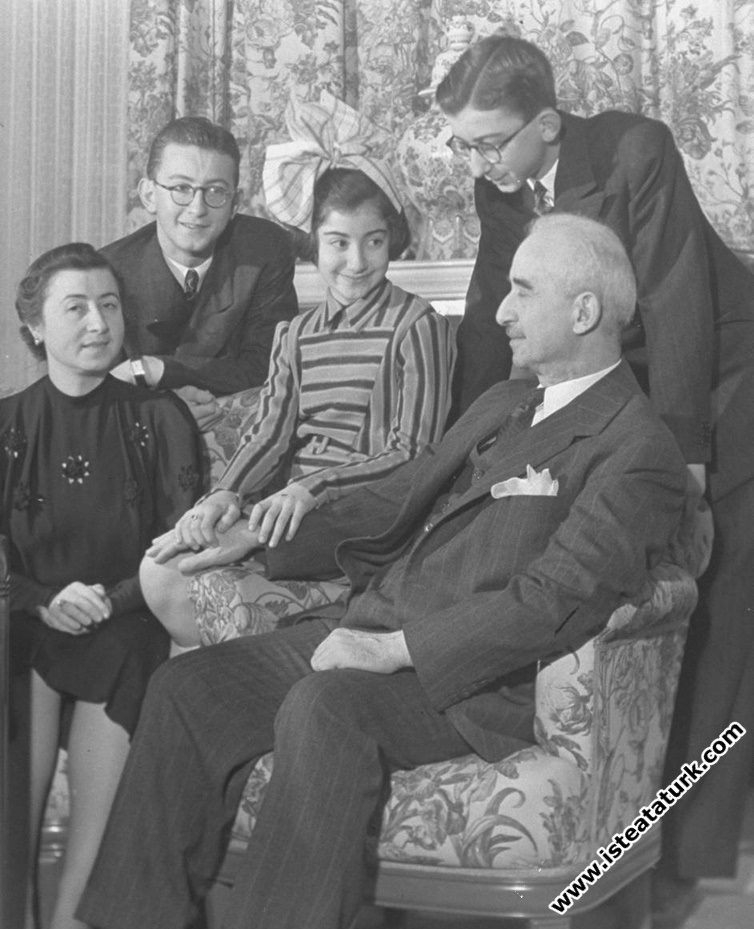
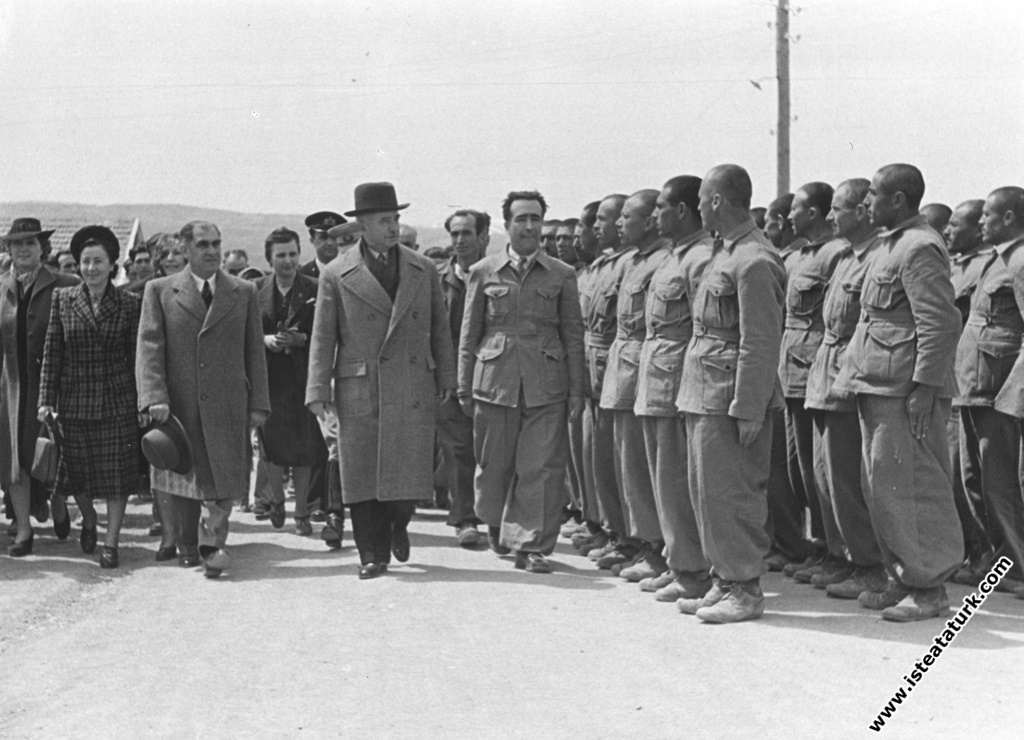
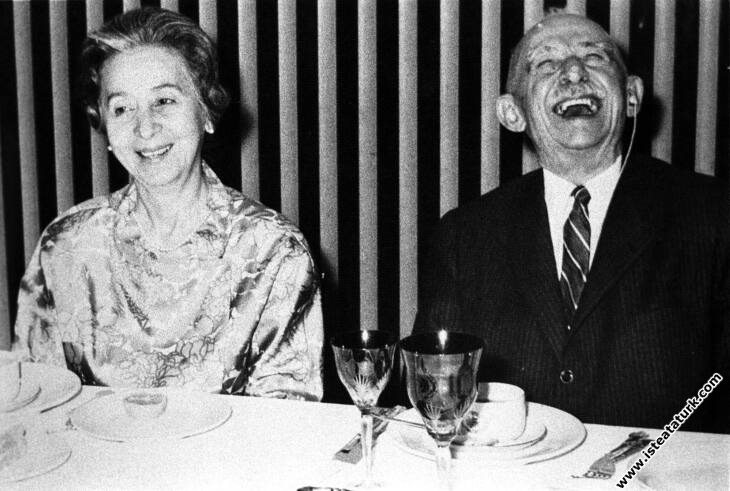
.JPG)
